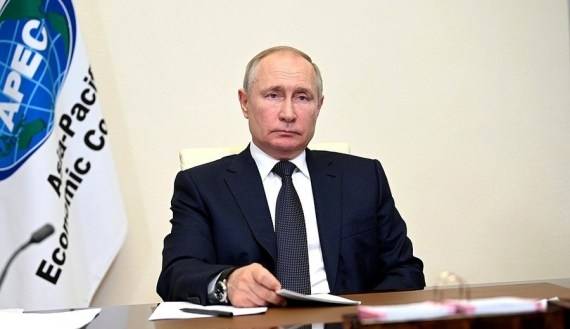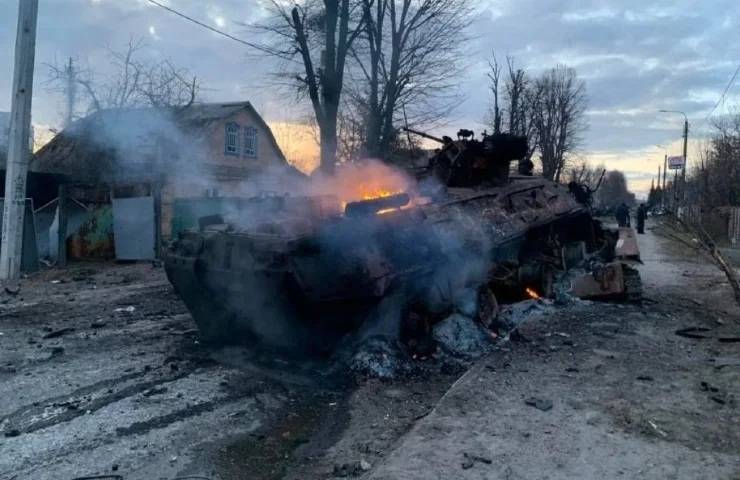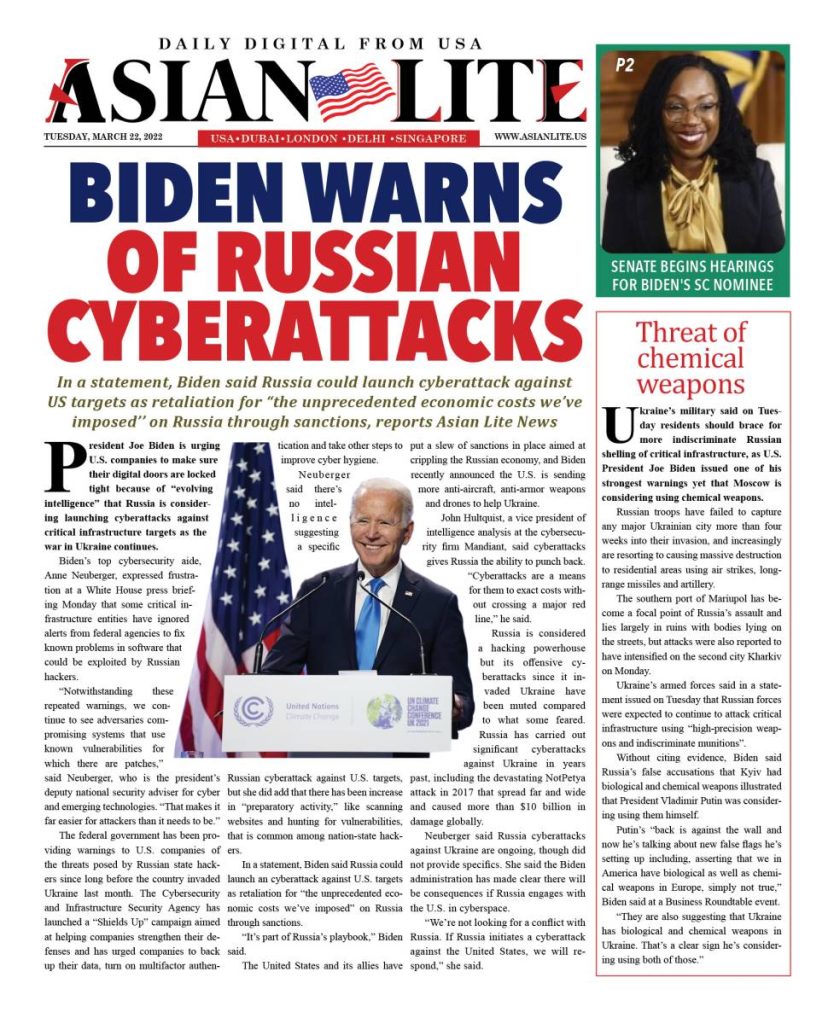
In a statement, Biden said Russia could launch cyberattack against US targets as retaliation for “the unprecedented economic costs we’ve imposed” on Russia through sanctions, reports Asian Lite New
President Joe Biden is urging U.S. companies to make sure their digital doors are locked tight because of “evolving intelligence” that Russia is considering launching cyberattacks against critical infrastructure targets as the war in Ukraine continues.
Biden’s top cybersecurity aide, Anne Neuberger, expressed frustration at a White House press briefing Monday that some critical infrastructure entities have ignored alerts from federal agencies to fix known problems in software that could be exploited by Russian hackers.
“Notwithstanding these repeated warnings, we continue to see adversaries compromising systems that use known vulnerabilities for which there are patches,” said Neuberger, who is the president’s deputy national security adviser for cyber and emerging technologies. “That makes it far easier for attackers than it needs to be.”

The federal government has been providing warnings to U.S. companies of the threats posed by Russian state hackers since long before the country invaded Ukraine last month. The Cybersecurity and Infrastructure Security Agency has launched a “Shields Up” campaign aimed at helping companies strengthen their defenses and has urged companies to back up their data, turn on multifactor authentication and take other steps to improve cyber hygiene.
Neuberger said there’s no intelligence suggesting a specific Russian cyberattack against U.S. targets, but she did add that there has been increase in “preparatory activity,” like scanning websites and hunting for vulnerabilities, that is common among nation-state hackers.
In a statement, Biden said Russia could launch an cyberattack against U.S. targets as retaliation for “the unprecedented economic costs we’ve imposed” on Russia through sanctions.
“It’s part of Russia’s playbook,” Biden said.
The United States and its allies have put a slew of sanctions in place aimed at crippling the Russian economy, and Biden recently announced the U.S. is sending more anti-aircraft, anti-armor weapons and drones to help Ukraine.
John Hultquist, a vice president of intelligence analysis at the cybersecurity firm Mandiant, said cyberattacks gives Russia the ability to punch back.
“Cyberattacks are a means for them to exact costs without crossing a major red line,” he said.
Russia is considered a hacking powerhouse but its offensive cyberattacks since it invaded Ukraine have been muted compared to what some feared. Russia has carried out significant cyberattacks against Ukraine in years past, including the devastating NotPetya attack in 2017 that spread far and wide and caused more than $10 billion in damage globally.
Neuberger said Russia cyberattacks against Ukraine are ongoing, though did not provide specifics. She said the Biden administration has made clear there will be consequences if Russia engages with the U.S. in cyberspace.
“We’re not looking for a conflict with Russia. If Russia initiates a cyberattack against the United States, we will respond,” she said.

Threat of chemical weapons
Ukraine’s military said on Tuesday residents should brace for more indiscriminate Russian shelling of critical infrastructure, as U.S. President Joe Biden issued one of his strongest warnings yet that Moscow is considering using chemical weapons.
Russian troops have failed to capture any major Ukrainian city more than four weeks into their invasion, and increasingly are resorting to causing massive destruction to residential areas using air strikes, long-range missiles and artillery.
The southern port of Mariupol has become a focal point of Russia’s assault and lies largely in ruins with bodies lying on the streets, but attacks were also reported to have intensified on the second city Kharkiv on Monday.

Ukraine’s armed forces said in a statement issued on Tuesday that Russian forces were expected to continue to attack critical infrastructure using “high-precision weapons and indiscriminate munitions”.
Without citing evidence, Biden said Russia’s false accusations that Kyiv had biological and chemical weapons illustrated that President Vladimir Putin was considering using them himself.
Putin’s “back is against the wall and now he’s talking about new false flags he’s setting up including, asserting that we in America have biological as well as chemical weapons in Europe, simply not true,” Biden said at a Business Roundtable event.
“They are also suggesting that Ukraine has biological and chemical weapons in Ukraine. That’s a clear sign he’s considering using both of those.”
The Russian embassy in Washington did not immediately respond to a request for comment.
Biden also told businesses to be alert for possible cyber attacks by Russia. “It’s part of Russia’s playbook,” he said in a statement.
Washington and its allies have previously accused Russia of spreading an unproven claim that Ukraine had a biological weapons programme as a possible prelude to using such weapons itself, but Biden’s remarks on Monday were some of his strongest yet on the subject.
Russia says it does not attack civilians although the devastation wrought on Ukrainian towns such as Mariupol and Kharkiv are reminiscent of previous Russian assaults on cities in Chechnya and Syria.

Putin calls the war, the biggest attack on a European state since World War Two, a “special military operation” to disarm Ukraine and protect it from “Nazis”. The West calls this a false pretext for an unprovoked war of aggression.
Biden is due to travel to Europe this week for meetings with allied leaders to discuss tighter sanctions on Russia, on top of the unprecedented financial penalties already announced. Ahead of the trip he discussed Russia’s “brutal” tactics in a call with European leaders on Monday, the White House said.
Russia’s siege and bombardment of Mariupol port, which European Union foreign policy chief Josep Borrell called “a massive war crime”, is increasing pressure for action.
But EU foreign ministers on Monday disagreed on whether and how to include energy in sanctions, with Germany saying the bloc was too dependent on Russian oil to declare an embargo.
ALSO READ: Biden’s ‘new world order’ remark raises eyebrows


